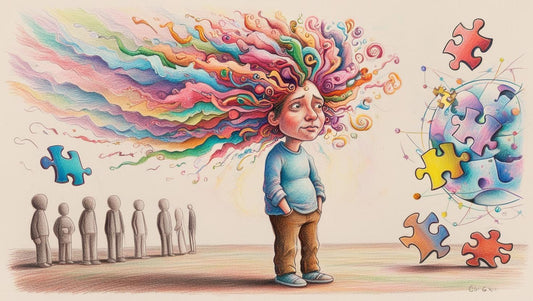
The Letter We Never Got to Finish — Until Now
Share
Dear Neurotypicals,
I see you, and I appreciate the effort you put into understanding. I know you care, and that means a lot. The struggle to find the right words comes from the complexity of living in a world that wasn’t designed for people like me. As a neurodivergent person in a neurotypical world, it often feels like we don’t quite fit into the spaces designed for everyone else. The way we think, feel, and experience life can be different—and that’s okay.
Neurodivergent people are not all the same. We come in many shapes and forms, with experiences and ways of functioning that vary from one person to the next. The things that affect us and the way we perceive the world can be vastly different. Some of us thrive with structure, others find it stifling. Some of us hyperfocus on tasks, while others struggle to stay on track. What unites us is the need for acceptance of our differences, not attempts to make us fit into a predefined mold.
When I share my perspective, sometimes it can seem like an invitation to change or “fix” me, but I’m not broken. I’m simply navigating a world that wasn’t built with people like me in mind, and while it can be exhausting, it’s part of what makes me who I am.
You admire the strengths ADHD gives me. You love the way my mind works—how I can think outside the box, solve problems creatively, and see the world in ways others don’t. You enjoy my quick wit, my humor, and my unique quirks. People admire our intelligence, our honesty, our ability to hyperfocus on things we’re passionate about. And I love that, too. It feels good to be valued for those things.
But while these strengths are easy to admire, there’s a side to ADHD that’s not so easy to accept. It’s the side where even the smallest decisions, like whether to take medication, become a complicated, emotional journey. The side where we forget the thing you just told us. The side where we start ten projects and finish none. The side where the laundry sits unfolded for days because the steps between washing and putting it away feel impossible. The side where we cut you off mid-sentence because our brain is moving faster than our mouth. The side where the chaos inside our minds makes even the simplest tasks feel overwhelming.
I once had a conversation with someone who was frustrated that a person in their life couldn’t decide whether they wanted to take their ADHD medication or not. They didn’t understand why this person kept going back and forth, struggling with the decision. And in that moment, I felt an ache in my chest—because I know exactly why. I know how hard that choice is.
Taking medication isn’t just about managing symptoms; it’s about questioning who we are without it. When I take it, I feel more in control, more capable of handling the world. But then I wonder—am I only functioning because of it? Is this version of me the “real” me, or just a medicated version that’s easier for others to accept? The person I was before medication, the one I’ve always known, starts to feel like a stranger. Is that growth? Or is it losing myself?
But the challenges don’t stop at medication. The judgments we face don’t just come from how we manage our symptoms—they’re also embedded in the sensory overload we experience every day.
Imagine constantly questioning who you are—because that’s what it feels like. When my brain is in overdrive, I don’t always know which version of me is the real one. Am I the person who struggles to focus, who loses track of time, who gets completely overwhelmed by the world around me? Or am I the person who, with just the right balance of structure, medication, and routine, appears put-together enough to function in a way that makes sense to everyone else?
Sensory overload isn’t just an inconvenience; it’s an everyday reality. The world is too bright, too loud, too unpredictable. The smallest things—background chatter, the hum of fluorescent lights, the way clothing tags itch—can be overwhelming to the point of shutting down. And then there’s the chaos inside my head. My mind runs a million miles an hour, juggling thoughts, ideas, and anxieties all at once. It’s exhausting—and when I try to communicate all that noise, it feels like I’m speaking a language no one else understands.
And yet, when I find ways to manage it, when I seem “better” or “more focused,” I wonder—does that mean this is who I’m supposed to be? Does that mean the unfiltered version of me—the one who gets lost in my own world, the one who needs constant reminders, the one who struggles—is someone people don’t actually want?
I need space, and sometimes, that’s hard for people to understand. It’s not that I don’t love or appreciate the people in my life—it’s that navigating a world that constantly demands so much from me is exhausting. Social interactions, conversations, expectations, they all take energy, and some days, I just don’t have enough left to give. It’s not personal. It’s survival.
And then there’s the way I communicate. I know it doesn’t always make sense to neurotypicals. I might overshare, saying exactly what’s on my mind, too directly at times, without fully recognizing what’s “socially acceptable” to share. It’s not that I don’t care, sometimes, my thoughts spill out faster than I can filter them, and when I start overthinking those moments, it all gets too overwhelming. That's when I shut down. Instead of continuing the conversation, I simply say, 'I’m fine,' but it’s far from the truth. It’s not always easy to express my feelings, and when I do, I worry—do you truly hear me? Or are you just trying to fix me?
And that’s what makes it so difficult to explain. I’m not broken. I don’t need to be fixed. What I need more than anything is simply understanding. I need to know that the parts of me that are messy, chaotic, and sometimes frustrating are just as valid as the parts that are witty, creative, and sharp. It’s easy to love the parts of me that make you laugh, that problem-solve in ways you’d never expect, that bring a fresh perspective to things. But can you love the parts that aren’t so easy? The forgetfulness, the overstimulation, the times I shut down because the world is too much?
What I don’t need is for someone to tell me how to be 'better.' I need the freedom to simply be who I am, without the constant pressure to conform or meet an invisible standard. I need to know that I don’t have to question which version of me is “right” or “worthy.” Because at the end of the day, I’m not here to fit into someone else’s definition of normal. I’m here to be unapologetically myself, and that’s enough. And if you take the time to truly understand that, you’ll see just how powerful that really is.
Yours, unapologetically neurodivergent.



